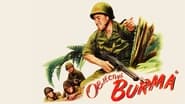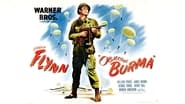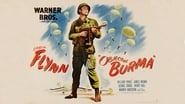calvinnme
...probably one of the better ones about WWII made during WWII. In it a group of American paratroopers are dropped into the Burmese jungles to destroy a Japanese radar station. Things don't go as expected, of course, and instead of being picked up by an airplane after their mission is completed they are forced to trek through the jungles and battle the elements to make their escape.Director Raoul Walsh was in good form when he directed this overlong but effective film which adopts a semi documentary approach. James Wong Howe also scored well with his striking photography which really adds to the film's realistic credibility. Howe captures the scorching heat of the jungle in this production, whose principle photography was largely done on "Lucky" Baldwin's Santa Anita ranch. There was also a fine musical score by Franz Waxman, including a impressive military march theme.While the characters are the usual army stereotypes, the restrained performances of the cast add to the film's sense of realism. This includes Errol Flynn, who well portrays an ordinary guy who's in command. His commanding officer is not the belligerent macho type to be found in many military films but, instead, a humane officer who cares about his men who, in turn, respect him. Flynn regarded this film as one of the best of his career. Also look out for the terrific performances by several actors that later went on to well known TV roles such as George Tobias who played Mr.Kravitz on Bewitched and Hugh Beaumont who was The Beaver's dad.The film has one dated over-the-top diatribe by Henry Hull as a newsman accompanying the soldiers in which he rants about the Japanese as "stinking little savages" who should be wiped off the face of the earth. Oh well, I guess if I'm going to watch the films of 1945, then I should be prepared to deal with the values of 1945.At the same time, however, the film has some great dialogue. For example, after a soldier named Hollis is found dead, one of the paratroopers, in retrieving the soldier's dog tag, says, "So much for Mrs. Hollis's 9 months of pain and 20 years of hope." In speaking of the pain that a mother will feel when she receives the news about her son, the film briefly touches upon a common humanity we all feel with the grief and tragedy of war.
RichyMack
Although total fiction, which most war movies are, It's a shame this movie was banned in England because it didn't show any Brits in action. To them this movie was historically incorrect. Yes, we know the Brits were present in large numbers fighting in Burma and not so much the Yanks. So when an all American company was sent to Burma to knock out a radar tower in favor of the Brits that just rubbed them wrong. Now If the movie had a different title like, "OBJECTIVE TARAWA" they would be praising this movie as one of the greats which it was. This movie had everything a war movie should have,great acting by all, especially Flynn, realistic looking locations, and the shoot em up scenes we so realistic for the times not like an exaggerated Shoot em up Stalone move. And that exciting survival journey through the Burmese jungle will keep you glued to your seat. I agree with the other comments on Errol Flynn this was his best performance.
johnkistner
As a drama the film does a good job, in terms of historical accuracy one questions it. The fighting in Burma was not carried out by the USA, but by the army of the United Kingdom. Had this operation actually occurred, it would have been carried out by the SAS. English soldiers fought in Burma from day one until the very end of the war. Fighting in the harsh, humid jungles of Burma was no easy task for the English army who were not accustomed to the extreme climate, the Japanese soldiers had the advantage. By suggesting that the USA came in and saved the day, I.e., the Calvary rushing in at the last minute, we minimise the role of her Majesty's forces and those who fell in her service. Many Englishmen paid the ultimate sacrifice for their queen and country. Burma was a British sphere of operation, just as the Philippines were an American theatre of operations. Let's not minimise the role of others.
Steffi_P
War films made during World War Two changed distinctly as the conflict wore on. At the beginning there were idealistic flag-wavers, feature-length recruitment ads. Then there were pictures about endurance and perseverance, designed to keep everyone's spirits up. In the final year of the war, when victory was certain yet the full cost and horror of it all was known and keenly felt, war movies began to take on a dark and bitter edge. Among the darkest and bitterest of them all was Objective Burma, released just a few months before the defeat of Japan.The story of Objective Burma, which gave writer Alvah Bessie his only Oscar nomination, involves a mission deep in the jungle which goes entirely according to plan, all except for the pickup of the men to get them back to base. The situation you then have is a group of soldiers stranded in a jungle swarming with hostile Japanese. What results is an incredibly tense story in which the hope is not one of victory but simply one of survival. It really makes a great basis for an action movie, because like a good horror flick it elicits a kind of thrill through the continual sense of danger. The characters are fairly one-dimensional GI stereotypes – cheeky, earthy, working class guys – that you can see in any cheap war flick, but this in a way adds to the horrific and harrowing impact of many of the later scenes. It soon becomes pretty clear that the "Burmese dancing girls" that one of the men jokingly refers to in an early scene, are not going to make an appearance in this kind of war film.Of course, it can only work if we the audience feel immersed in that danger. This is where director Raoul Walsh comes in. Walsh was really adept at this sort of thing, and strives to constantly give us a feel of the soldiers' plight. His every shot seems composed to give us a sense of both the vastness and the oppressive closeness of the environment. Often he uses point-of-view shots, for example putting us in the position of a GI peeping out of the bushes at a passing Jap patrol. At other times he takes a god-shot, looking down on the pitiful band wending its way through the undergrowth. There's a great use of sound design, with various animal noises making eerie laughing and screeching noises. What is important too is Walsh's focus on faces. In a movie where, from a distance, every uniformed man looks alike, an occasional attention grabbing shot of some very individual expression helps to underline the sense of this as a human tragedy. As the situation becomes more and more desperate, Walsh literally darkens the screen, with the impressive James Wong Howe cinematography getting ever more shadowy.You couldn't have made Objective Burma at the height of the war. It's simply too bleak. It would be useless as recruitment propaganda. The one thing that really ties it to its era however is the vehemence it shows towards the Japanese. You really get that feeling of bitterness towards the foe in a protracted conflict, and even the kind of mindset that would start dropping nukes on cities. And then again, Operation Burma has a kind of timeless and placeless quality to it, being as it is so far removed from any kind of civilization or familiar reference point. Stripped down to a handful of men, a huge expanse of jungle and an ever-present but barely-glimpsed enemy, this is a suspenseful and exciting adventure with broad and lasting appeal.
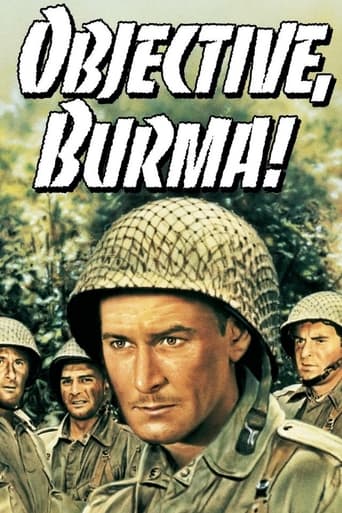
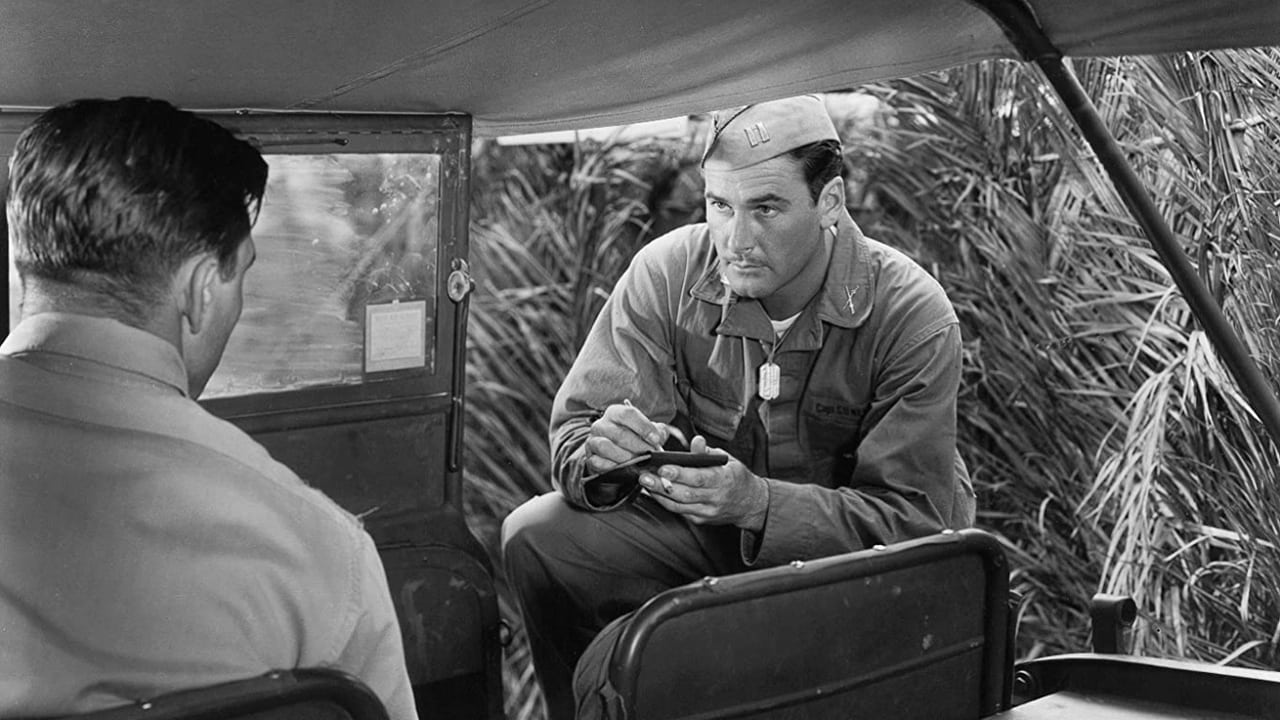

 AD
AD



